Government Can't Make Us Happy
By John Stossel
In the Declaration of Independence, Thomas Jefferson called the pursuit of happiness an unalienable right. This was a radical idea. For most of history, most people didn't think much about pursuing happiness. They were too busy just trying to survive.
Then came the liberal revolution based on the idea of individual freedom. Only then did they start thinking that happiness might be possible on earth.
Unfortunately, somewhere along the way, the right to pursue happiness has been perverted into a government-backed entitlement to happiness.
British Prime Minister David Cameron says, "There's more to life than money. ... It's time we focus not just on GDP, but GWB -- general well-being."
Well-being sounds good. But is that something that government programs promote?
Philip Booth, an economist with London's Institute of Economic Affairs and editor of "... And the Pursuit of Happiness," says no. I spoke recently with Booth and economist Christopher Coyne of George Mason University, who contributed to that volume.
Since the country of Bhutan got all kinds of publicity by using a measure it calls "gross national happiness" instead of gross national product, and The New York Times says it's a "new measure of well-being from a happy little kingdom," I asked them if there is anything to it.
"It's not a model that most Western societies would want to copy," Booth said.
I didn't think so. In Bhutan, people can get locked up for criticizing the government. Yet one study ranked the United States 23rd in the list of happy places. Bhutan was higher on the list.
That's nonsense, said Coyne. It makes more sense to judge a country's ability to make its citizens happy by whether foreigners want to move there. Clearly, more people want to move to America than to Bhutan. "The way to think about this," Coyne said, "is the fact that so many people want to come to the United States indicates that they at least perceive there is the opportunity to pursue what makes them happy."
What does make people happy? People fantasize about leisure and luxury, but the best data show that such things don't create lasting happiness. What does make for happiness is obtaining work that allows you to move toward goals that you find meaningful. In other words, what's important is not just employment, but purposeful work. So is having control over your workplace. Chrysler found that if workers have more control on the assembly line, they are happier. The freedom to decide your own goals is crucial.
Other things that make people happy are religion, having family and friends you care about, giving to others (face to face or via charity) and money.
Actually, money makes you happier if you're miserably poor. But once you have a certain amount -- maybe enough that you no longer have to worry about your family's well-being -- more money doesn't make much difference. Lottery winners report that, a year after their windfall, they were no happier than they were before.
That's counter-intuitive. Instinct tells us that wealth brings happiness. It's a reason why some people envy the rich and why income inequality causes lots of angst today. One left-wing journalist writes, "Every model shows the most unequal societies are the least happy."
"There's no evidence that this is true," Coyne said. "Even the staunchest proponents of government intervention to increase happiness admit that there's no relationship."
You wouldn't know that reading The New York Times.
The mainstream media claim that the way to make people happy is to have government protect them from misfortune and give them stuff. The research doesn't bear that out, says Booth.
"In fact, the bigger government is, the less happy societies tend to be. There is a direct relationship, stripping everything else out, between the government allowing people more freedom and well-being increasing."
Yet politicians move in the other direction. The socialist likely to be France's next president wants to lower the retirement age from 62 to 60 and institute a "maximum-work" law.
When will they learn that you don't make people happier by taking their options away?






